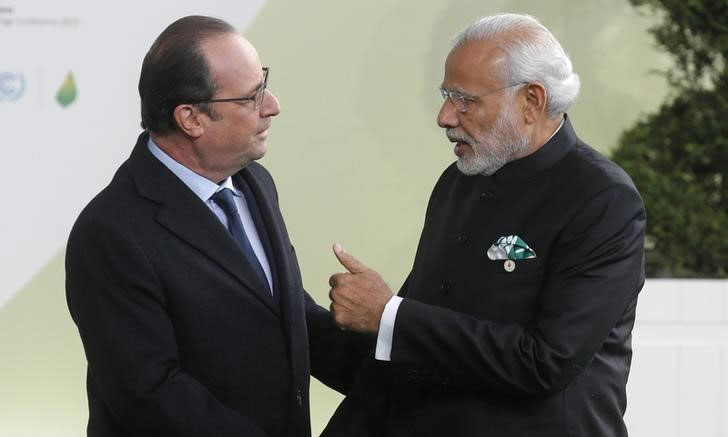
India’s Global Solar Alliance Boasts Big Claims But Draws Critics
The International Solar Alliance, a new organization announced this week at a major climate summit in Paris, drew plaudits from nongovernmental groups, but critics say the plan is merely symbolic considering the scale of the energy crisis.
This week the Indian government showed its power on the world stage—and that power came directly from the sun.
At the annual Conference of Parties (CoP) climate summit in Paris, Indian Prime Minister Narendra Modi announced a bold plan to launch the International Solar Alliance, whose goal will be making renewable energy dominant around the world.
“In the Indian tradition, Sun is the source of all forms of energy,” Modi said to the gathering of dignitaries on Monday, in announcing the alliance.
The alliance was announced by Modi and French President Francois Hollande, and the headquarters will be established at the National Institute of Solar Energy in India, with the Indian government putting in $30 million for its construction. The organization, which Modi says boasts 120 nations, hopes to raise as much as $400 million to encourage the use of solar energy worldwide, which will come from membership fees and global agencies.
The alliance, which aims to tie together the resources of both developing and developed nations, was widely praised by international research and climate organizations.
“This alliance brings in many other countries with vast solar potential, including many from Africa,” Manish Bapna, the managing director of the World Resources Institute, said in a media statement. “By facilitating international cooperation, the alliance will advance technology exchange, drive innovation and create new business opportunities in India and elsewhere.”
And The Climate Group’s executive director, Krishnan Pallassana, said that the alliance’s creation shows “there is a golden opportunity for the private sector to take advantage and move toward a prosperous low carbon future by demanding as well as investing in clean energy.”
The groundbreaking organization was welcomed, though, with skepticism by a few. Quartz, for example, noted that India is continuing to grow its fossil fuel energy, and while the alliance’s work could help encourage greater use of solar energy, it wouldn’t be enough on its own to keep global warming below the 2-degrees-celsius level—the goal of the climate summit.
And Grist noted that many of India’s residents lack access to electricity, and as that changes, it could encourage pollution that far outpaces the country’s potential growth in solar.
“India hasn’t been a big climate polluter yet, but as it connects its fast-growing population to the grid, it’s poised to become one,” the website’s Clayton Aldern comments, adding that the government’s monetary commitment to start the alliance was “symbolic but exceptionally tiny in the scheme of things.”
(Christan Hartmann/Reuters)






Comments